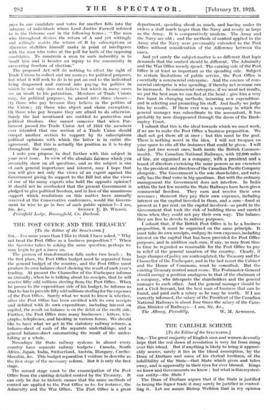THE POST OFFICE AND THE TREASURY
[To the Editor of the SPECTATOR.] Sin,—For more years than I like to think I have asked, " Why not treat the Post Office as a business proposition ? " When the Spectator takes to asking the same question, perhaps we may begin to get a move on.
The process of transformation falls under two heads : In the first place, the Post Office budget must be separated from the general budget of the country, and the Post Office must produce its own balance-sheet showing the result of each year's trading. At present the Chancellor of the Exchequer informs us annually, when he is talking about his receipts, that he will receive fifty odd millions sterling from the Post Office. When lie passes to the expenditure side of his budget, he informs us that he has to provide fifty odd millions sterling for the expenses of the Post Office. Surely what we want to know is whether, after the Post Office has been credited with its own receipts and debited with its own expenditure, including interest on capital, the result on balance is on the debit or the credit side. Further, the Post Office runs many businesses : letters, tele- graphs, telephones, and banking in various- forms. We should like to have what we get in the statutory railway returns, a balance-sheet of each of the separate undertakings, and a general balance-sheet summarising the result of the under- taking as a whole.
Nowadays the State railway systems in almost every country have separate railway budgets : Canada, South Africa, Japan, India, Switzerland, Austria, Hungary, Czecho- Slovakia, &e. This budget separation I venture to describe as the first stage of the necessary reform. But it is only the first stage. - -
The second stage must be the emancipation of the Post Office from the existing detailed control by the Treasury. It can only be due to historic causes that the same methods of control are applied to the Post Office as to, for instance, the Admiralty and the War Office. The Post Office is a great
department, spending about as much, and having under its orders a staff much larger than the Navy and nearly as large as the Army. It is comparatively modern. The Army and the Navy are old ; and the methods of control applied to the Army and the Navy were presumably extended to the Post Office without consideration of the difference between the cases.
And yet surely the subject-matter is so different that logic demands that the control should be different. The Admiralty and the War Office merely spend. The earning side of the Post Office is at least as important as the spending side. Subject to certain limitations of public service, the Post Office is essentially a commercial enterprise. And the essence of com- mercial enterprise is wise spending, if thereby net revenue can be increased. In commercial enterprise, if we want net results, we put the best man we can find at the head ; give him a very free hand in changing methods, incurring new expenditure and in selecting and promoting his staff. And finally we judge him by results. If there ever was a company in which the general manager was subordinate to the accountant, it has probably by now disappeared through the doors of the Bank- ruptcy Court.
I submit that this is the ideal towards which we must work, if we are to make the Post Office a business proposition. We shall not get there all at once ; but this must be the goal. There is nothing novel in the idea. I will not trespass on your space to cite all the instances that could be given. I will take just two recent ones, both inside the British Common. wealth. The Canadian National Railways, with 22,000 miles of line, are organized as a company, with a president and a board of directors exercising the same powers as are exercised by the president and directors of the Canadian Pacific Company alongside. The Government is the sole shareholder, and natu- rally has the final voice in big questions. But with the ordinary management the Government does not interfere. In India within the last few months the State Railways have been given commercial freedom. They earn and receive their own revenues ; thereout they pay their own expenses, including interest on the capital invested in them, and a sum—fixed at present as 1 per cent. on the capital involved—as profit to the Government that took the risk of building them and carried them when they could not pay their own way. The balance they are free to devote to railway purposes.
I submit that, if the British Post Office is to be a business proposition, it must be organized on the same principle. It must take its own receipts, andpay its own expenses, including interest on the capital that has been provided for Post Office purposes, and in addition such sum, if any, as may from time to time be regarded as reasonable for the Post Office to pay in relief of the general taxation of the country. Clearly, if large changes of policy are contemplated, the Treasury and the Chancellor of the Exchequer, and in the last resort the Cabinet and the House of Commons, must be consulted. But the existing Treasury control must cease. The Postmaster-General should occupy a position analagous to that of the chairman of a company, who interprets the shareholders and the general manager to each other. And the general manager should be not a Civil Servant, but the best man of business that can be found, and paid such a salary as he may be worth. If I am correctly informed, the salary of the President of the Canadian National Railways is about four times the salary of the Cana- dian Minister of Railways.-1 am, Sir, &c.,










































 Previous page
Previous page